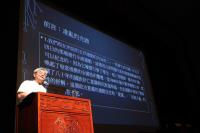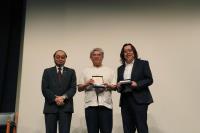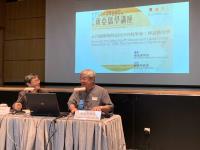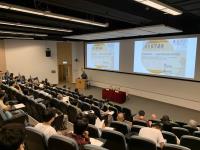
|
|








|






|
| Professor Yang Rur-bin chaired the New Asia Lectures on Confucianism 2019/20 | |
|
The 70th Anniversary Lecture of New Asia College & New Asia Lectures on Confucianism 2019 were successfully held in October 2019, with Professor Yang Rur-bin, Chair Professor of the Graduate Institute of Philosophy of National Tsing Hua University, as the keynote speaker. The New Asia Lectures on Confucianism were launched in 2013 under the sponsorship of the Moonchu Foundation. Each year, a distinguished scholar in Confucianism studies is invited to the College to deliver a series of three public lectures, with the aim of arousing interest among academics and the general public in more in-depth exploration of Confucianism through discussion on various issues. The First Lecture entitled "The First Type of May-Fourth Movement: The Role of Confucianism in the New Culture Movement of Modern China" was held at Sir Run Run Shaw Hall, CUHK at 6:30 p.m. on 16 October, and was moderated by Professor Cheng Chung-yi from the Department of Philosophy of CUHK. Professor Yang remarked that the significance of May-Fourth Movement did not lie only in the political context. Being the New Culture Movement in the early days of the republican era, the May-Fourth Movement incorporated the "democracy and freedom" advocated by liberalists, the "equality" championed by Marxists, the Confucianist scholars' criticism against the conservative elements of Chinese traditions on the basis of Confucianism, and modern ideas from the western culture, with the hope of achieving modernisation through integration of elements from the east and the west. The Second Lecture entitled "How Did the May-Fourth Movement Lead to the Revolution of 1949: The Dynamics of Mythology" was held at Lecture Hall, G/F, Hong Kong Museum of History at 3:00 p.m. on 20 October, with Professor Lau Kwok-ying from the Department of Philosophy of CUHK as the moderator. Professor Yang noted a strong linkage between the May-Fourth Movement and the Revolution of 1949. By elaborating on the symbols such as "darkness", "brightness" and "land" from the literary works of authors like Lu Xun and Wen Yiduo, Professor Lau pointed out that the mysterious force behind these symbols and their mythological implications constituted the nature of the existence of an era, and might actually be the major driving force of the revolution. The Third Lecture entitled "Conflict and Development of Confucian Dao-orthodoxy in Ming Dynasty" was held at the Lecture Theatre 2, Yasumoto International Academic Park, CUHK on the afternoon of 21 October, and was moderated by Professor Yao Zhihua from the Department of Philosophy of CUHK. Professor Yang started by saying that China's authoritarianism reached its zenith in the Ming Dynasty, when Emperor Zhu Yuanzhang took his mistrust and oppression of Confucian scholars to the extreme. However, the Ming scholars kept up their political resistance, and the Dao-orthodoxy proposed by Zhu Zi as a counterforce against the regime became the moral ideal of the Ming scholars. During these three lectures, Professor Yang illustrated to the audience the important role Confucianism played in the modernisation of China. At the end of each lecture, Professor Yang was eager to share his academic experiences and insights with the audience, who in turn expressed their sincere thanks to Professor Yang for letting them learn much from the lectures. Besides, the "Exhibition of Publications by Professor Yang Rur-bin, Distinguished Scholar of the New Asia Lectures on Confucianism 2019" was successfully held on G/F, New Asia College Ch'ien Mu Library during 2 October to 4 November 2019. |
|
Copyright 2025. New Asia College, The Chinese University of Hong Kong. All Rights Reserved.
This E-Newsletter is solely owned by New Asia College. The College accepts no liability for any loss or damage howsoever arising from
any use or misuse or reliance on any information in this E-Newsletter.













